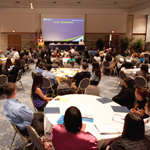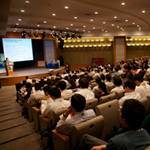How long will the ‘digital spring’ that the Italian healthcare system is experiencing last? This was the basic question addressed in a recent webinar ‘Healthcare after the COVID emergency: from clinical needs to digital evolution’, hosted by the HIMSS Italian Community. The webinar, moderated by Paolo Locatelli, scientific director of Digital Innovation in Healthcare Observatory – Politecnico of Milan, raised awareness of the true potential that digital tools have, but also the many challenges that still exist – and the need to confront these before a potential second wave of the coronavirus arrives.
“COVID-19 has highlighted that medicine needs to change,” said Sergio Pillon, member of the Digital Health Working Group – European Public Health Alliance (WG-DH EPHA) and medical director of CIRM. He continued: “The emergency has shown our patients have a yearning for digital. What about local health authorities? They send faxes. This is not prehistory. Today, photocopied paper cards are still used for COVID triages.”
There are, however, digital tools and platforms available. A multidisciplinary group headed by ALTEMS – Catholic University Sacred Hearth, for instance, has developed a ‘teleconsultation manual in virtual outpatients’ training on how to use existing remote medicine tools in a healthcare facility. Moreover, the ‘Innova Italia’ Call was launched by the Agency for Digital Italy (AgID) to pool technologies and innovation in the fight against coronavirus and has resulted in gathering two thousand initiatives.
Learning and sharing Italian best practices
There is no shortage of best practices and Trentino Province, in northern Italy, is clear proof of this. In the small autonomous province, the healthcare digitisation process started more than 10 years ago and has already produced the TreC platform. The pandemic expedited change as Diego Conforti, director of Innovation and Research Office, healthcare department, Trento Province, explains: “The national healthcare range of fees (the list of services and devices with the corresponding costs, that can be provided by Italian NHS) was immediately revised and the providing of healthcare services, including telemedicine was approved. Teleconsultation types have been estabilished which include: basic multimedia video-chats, and chatbots with telemonitoring tools. A variety of teleconsultation tools have been implemented with different medical specialists such as paediatricians, ophthalmologists, diabetologists and cardiologists respectively. According to Conforti, the risk now is to not capitalise on all the immense efforts made during these phases and highlights the critical importance of ensuring integration with hospital and local healthcare systems.
Furthermore, the panellists taking part in the webinar generally agreed that the three key areas of focus should now be placed on: telemedicine, continuity of care through digital platforms, and artificial intelligence.
Source: https://www.healthcareitnews.com/news/europe/covid-19-digital-spring-facing-italy























